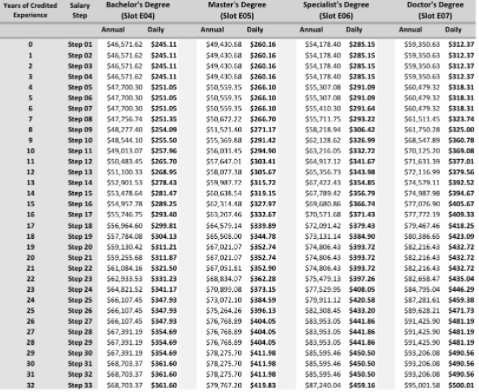Teachers are the backbone of education. Their job is not an easy one and it is not without its challenges, but their pay often does not reflect that.
Different factors go into a teacher’s pay, such as seniority. There are lingering issues surrounding salaries, such as bonuses and compensation, as well as increasing salaries since the recession to draw in teachers and return salaries to pre-recession numbers.
The factors of a teacher’s salary are set, but the numbers can grow with time.
“Pay is dependent on your degree and years experience,” said English teacher Zachary Welser.
Salaries increase from a bachelor to a master’s to a doctorate degree, and any extra certification can add a pay boost.
“It used to be that you’d get what they call a step increase for your tenure if you made it to five years, ten years you would get an extra bump.” said economics teacher Carolyn Fraser. “The county has been trying to catch up with the wage loss from 2008 because from 2008 to 2010 we actually took a wage cut because of the recession.”
Teachers now have furlough days where they are not paid, but come to work while the county has steadily tried to increase wages over the last three years. This year, all Chamblee teachers received raises of two percent of their total salary.
The subject matter a teacher teaches is not a factor when calculating salary; however, some counties take it into consideration. Subject based salaries are not necessarily ideal for the Chamblee Charter High School structure.
“You don’t know what you’re going to teach year-to-year, so that would be difficult if [pay] was based on one class,” said science teacher Karen Porter-Davis. “It would also I think split the faculty apart if that was what it was based upon, though I do think they’re going to have to increase everyone’s pay to entice especially math and science teachers. We have a very hard time finding qualified teachers.”
That raises the question whether or not more qualified teachers who teach higher level courses should make more. AP teachers teach college level courses, but do not make any more or as much as college professors.
“Should AP teachers get more money– no, because they’re getting kids that are really motivated, so that makes teaching easier. It’s really, really difficult to teach unmotivated students,” said Fraser. “And sometimes when you’re in a classroom that big with a bunch of kids that may not be as motivated as you, it makes it that much harder.”
However, if pay was increased in different ways, such as bonuses, there could be more of an incentive for teachers.
“Some districts do this– they’ll give you a pay increase if your results are better,” said Fraser. “Now that is a fine line to walk. When it is an AP test, if I could get a bonus for every student that passes, that would be more motivating for me. They put my percentage pass rate up in the conference room, so there is a certain personal pride to get that number higher. If they put dollars behind it, it would be a big difference.”
But Fraser pointed out that adding bonuses would have to have to be carefully done as to not enable teachers to cheat, like in the Atlanta Public School System, where administrators were offered bonuses for higher test scores, so they changed students CRCT results. However, she still believes in bonuses.
“Just like in business, if you meet a certain quota sometimes you get a bonus and I don’t think education should be out of that,” said Fraser. “But just like in industry you have to be careful not to rig the game.”
Also, gym coaches are paid for their time spent coaching team sports after school, but core class teachers who sponsor clubs do not receive any extra.
“As in any other profession, you get compensated for time outside of your work week,” said Fraser.” In education we don’t do that. Teachers will sponsor clubs or groups and get no compensation. All teachers, coaches included, should receive compensation because we are asking you to put time into your work that it uncompensated.”
Nevertheless, salaries are designed by set factors of experience and degree and it is unlikely to change. However, Welser pointed out that even if he went back for a higher degree, that would not necessarily make him a better teacher.
“It may make me smarter, but I’m not going to teach any better or differently,” said Welser.
Porter-Davis claims that experience is essential, but more so worldly experience, more than years in a classroom.
“You’d think it would be experience, but you see a look of great, young teachers and then teachers who have been teaching a long time who aren’t doing so well,” said Porter- Davis. “You can get a degree in education or get one in hard science, English, or whatever and they’re all treated the same way in regards to pay. You could go online and find an easier route to more pay that wouldn’t necessarily translate to the classroom.”
Regardless of the trials and tribulations that come with being a teacher, few jobs are more satisfying.
“I found that my former profession didn’t give me the satisfaction,” said Fraser. “I made more money, but it was hard to get up and go to work everyday. You need to have that sense of helping and contributing to future generations.”








